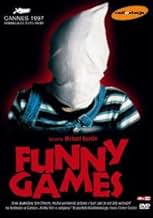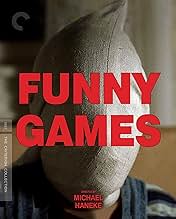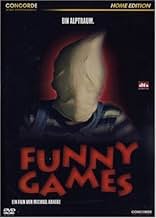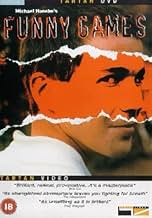Funny Games
Two violent young men take a mother, father, and son hostage in their vacation cabin and force them to play sadistic "games" with one another for their own amusement.Two violent young men take a mother, father, and son hostage in their vacation cabin and force them to play sadistic "games" with one another for their own amusement.Two violent young men take a mother, father, and son hostage in their vacation cabin and force them to play sadistic "games" with one another for their own amusement.
- Awards
- 5 wins & 9 nominations total
- Director
- Writer
- All cast & crew
- Production, box office & more at IMDbPro
Featured reviews
I saw this movie again last night, for the third time, and once again had to keep watching each torturous minute until its chilling end. Going through the comments index, I see the expected responses: it was boring: it was pointless: it was too long: it's a satire: the games aren't actually that funny: it involved the audience in a neato way: it's nothing new: it's been done before. So I here offer an interpretation to add to the cacophany of reactions that FUNNY GAMES seem to engender.
What this movie reminds me of is the Book of Job, in the Bible, where God and Satan decide for their own amusement to torture this guy Job, killing his family, racking him with boils, and various other divine amusements. While watching this movie last night, I thought of another reference, this time from "King Lear": "Like flies to wanton schoolboys are we to the gods;/ They kill us for their sport." What this movie does is challenge the audience's own involvement in visual narrative -- usually, we watch movies from somewhere on-high and omniscient; we're invisible but we see all; we're voyeurs, just like God. In Haneke's film, we identify not with the victims but with the all-powerful killers as they set about their funny games. The two polite young men are performing their entertainments for us, the viewers; they're slaking our bloodthirst, our desire for gory spectacle - - after all, isn't this why we watch movies like this in the first place? Haneke, however, doesn't play the usual evasions; he makes explicit the audience's participation in violence; and he forces upon us the need to take responsibility for it.
I find this fascinating. I also find the negative comments here fascinating as well -- "not violent enough!" "the victims deserve to die..." "all the violence is off-screen..." "no gore at all, 'LAST HOUSE ON THE LEFT' did it first, with more blood...." etc. as being inadvertantly revealing of those viewers' psyche. I especially love the comment made by that one Viking guy, who writes that Haneke's film has "no point," and goes on to say "...I just hope those people break into MY house, so I can break them in two!"
I think Haneke made his point.
What this movie reminds me of is the Book of Job, in the Bible, where God and Satan decide for their own amusement to torture this guy Job, killing his family, racking him with boils, and various other divine amusements. While watching this movie last night, I thought of another reference, this time from "King Lear": "Like flies to wanton schoolboys are we to the gods;/ They kill us for their sport." What this movie does is challenge the audience's own involvement in visual narrative -- usually, we watch movies from somewhere on-high and omniscient; we're invisible but we see all; we're voyeurs, just like God. In Haneke's film, we identify not with the victims but with the all-powerful killers as they set about their funny games. The two polite young men are performing their entertainments for us, the viewers; they're slaking our bloodthirst, our desire for gory spectacle - - after all, isn't this why we watch movies like this in the first place? Haneke, however, doesn't play the usual evasions; he makes explicit the audience's participation in violence; and he forces upon us the need to take responsibility for it.
I find this fascinating. I also find the negative comments here fascinating as well -- "not violent enough!" "the victims deserve to die..." "all the violence is off-screen..." "no gore at all, 'LAST HOUSE ON THE LEFT' did it first, with more blood...." etc. as being inadvertantly revealing of those viewers' psyche. I especially love the comment made by that one Viking guy, who writes that Haneke's film has "no point," and goes on to say "...I just hope those people break into MY house, so I can break them in two!"
I think Haneke made his point.
I think there is a valid argument to make that the universal visceral impact that Funny Games has on audiences undermines the very thesis of its director Michael Haneke. I use the word thesis very deliberately because Funny Games is an intellectual academic statement. Plainly it is not an entertainment movie but I don't consider it to be an art film either. Haneke intended it to be neither in my opinion. I think he intended it as an assault on both Hollywood and the audience. It's the cinematic equivalent of punk. Rock music against rock music. This is an analogy Haneke draws the audience to himself by overriding the classical music Anna and Georg are listening to with some extreme punk music on the sound track. We are left in doubt that the world of Funny Games belongs to Peter and Paul. Anna and Georg and their bourgeois taste in music are treated with utter contempt before Peter and Paul even appear on the screen.
Getting back to my original point: I think there are two parts to Haneke's thesis. The first is that Hollywood has commodified and sanitised violence and turned it into thrilling entertainment. Hollywood violence doesn't show the reality of violence or its consequences on those it is inflicted on. The second part of his thesis is that Hollywood's portrayal of violence has dehumanised and inured the audience and reduced their capacity for empathy and sensitivity. I fully agree with the first part of his thesis. The problem is most people do. I think you would be hard pushed to find any reasonably intelligent, educated person who doesn't agree with Haneke in this regard. Anyone who doesn't isn't going to be enlightened by watching Funny Games. On this point I can't help feeling that he preaching to the converted.
It's the second part of his thesis that he inadvertently undermines. Haneke set out very deliberately to make violence real again so that the audience feels it in their gut. Funny Games isn't real violence though. It's still just a film. However it is a film that manages to make a huge impact on an audience well accustomed to watching violence on the screen. This clearly indicates to me that audiences are smart enough and sensitive enough to be able to tell the difference between Hollywood trite and a convincing portrayal of violence. You could argue that Haneke had to resort to making such an extreme film to have the intended impact on an audience dulled by years of cinematic violence. However Funny Games isn't actually that violent. Compared to the average Arnold Swarzenegger movie it's actually quite tame in both the quantity of violence and how graphically it's portrayed. What makes Funny Games so disturbing is the emotional content in the impact and consequences of the violence on the victims. This is effectively contrasted with the casual approach, understated sadism and emotional shallowness of the perpetrators. If audiences were as lacking in sensitivity as I think Haneke is suggesting then surely Funny Games would have simply have been accepted as another piece of horror entertainment.
Haneke said something along the lines that anyone who stops watching before the end doesn't need Funny Games, anyone who watches it to the end does need it. This strikes me as thoroughly arrogant and is quite wrong in my opinion. Nothing can be implied about anyone who watches it to the end and there is no such thing as a film that an audience needs. Funny Games is a superb piece of cinema and there is no doubt that Haneke was fully successful in what he set out to achieve. However what exactly is it that Haneke thinks that the audience needs from it? As I said earlier most of the audience already understands the point he is making about Hollywood. It seems to me that Haneke is trying to shame the audience into realising how immoral they are for watching violent films. I fundamentally disagree with him if this is his intention. Personally I have no problem with the cartoon violence of Hollywood for the very reason that it is lacking in any real emotional content. It would seem that Haneke not only has a problem with the cartoon violence in films but with actual cartoons. Both Tom and Jerry and Beavis and Butthead are referenced in Funny Games. If Haneke is seriously suggesting that Tom and Jerry cartoons are a moral problem then he is beyond ridiculous.
Having said all this I still give Funny Games a 10 out of 10. Whether we agree with Haneke or not he made us react, think, defend and argue. He also made a truly remarkable film with some of the most heart breaking and profound acting I have ever seen. Funny Games a deeply intelligent film and I don't doubt Haneke's total sincerity and moral integrity. I just don't necessarily agree with him.
Getting back to my original point: I think there are two parts to Haneke's thesis. The first is that Hollywood has commodified and sanitised violence and turned it into thrilling entertainment. Hollywood violence doesn't show the reality of violence or its consequences on those it is inflicted on. The second part of his thesis is that Hollywood's portrayal of violence has dehumanised and inured the audience and reduced their capacity for empathy and sensitivity. I fully agree with the first part of his thesis. The problem is most people do. I think you would be hard pushed to find any reasonably intelligent, educated person who doesn't agree with Haneke in this regard. Anyone who doesn't isn't going to be enlightened by watching Funny Games. On this point I can't help feeling that he preaching to the converted.
It's the second part of his thesis that he inadvertently undermines. Haneke set out very deliberately to make violence real again so that the audience feels it in their gut. Funny Games isn't real violence though. It's still just a film. However it is a film that manages to make a huge impact on an audience well accustomed to watching violence on the screen. This clearly indicates to me that audiences are smart enough and sensitive enough to be able to tell the difference between Hollywood trite and a convincing portrayal of violence. You could argue that Haneke had to resort to making such an extreme film to have the intended impact on an audience dulled by years of cinematic violence. However Funny Games isn't actually that violent. Compared to the average Arnold Swarzenegger movie it's actually quite tame in both the quantity of violence and how graphically it's portrayed. What makes Funny Games so disturbing is the emotional content in the impact and consequences of the violence on the victims. This is effectively contrasted with the casual approach, understated sadism and emotional shallowness of the perpetrators. If audiences were as lacking in sensitivity as I think Haneke is suggesting then surely Funny Games would have simply have been accepted as another piece of horror entertainment.
Haneke said something along the lines that anyone who stops watching before the end doesn't need Funny Games, anyone who watches it to the end does need it. This strikes me as thoroughly arrogant and is quite wrong in my opinion. Nothing can be implied about anyone who watches it to the end and there is no such thing as a film that an audience needs. Funny Games is a superb piece of cinema and there is no doubt that Haneke was fully successful in what he set out to achieve. However what exactly is it that Haneke thinks that the audience needs from it? As I said earlier most of the audience already understands the point he is making about Hollywood. It seems to me that Haneke is trying to shame the audience into realising how immoral they are for watching violent films. I fundamentally disagree with him if this is his intention. Personally I have no problem with the cartoon violence of Hollywood for the very reason that it is lacking in any real emotional content. It would seem that Haneke not only has a problem with the cartoon violence in films but with actual cartoons. Both Tom and Jerry and Beavis and Butthead are referenced in Funny Games. If Haneke is seriously suggesting that Tom and Jerry cartoons are a moral problem then he is beyond ridiculous.
Having said all this I still give Funny Games a 10 out of 10. Whether we agree with Haneke or not he made us react, think, defend and argue. He also made a truly remarkable film with some of the most heart breaking and profound acting I have ever seen. Funny Games a deeply intelligent film and I don't doubt Haneke's total sincerity and moral integrity. I just don't necessarily agree with him.
I don't know what to rate this. Although I can appreciate what Haneke was going for, the morally condescending tone didn't work for me. While you could write a book on the topic, I'll keep my thoughts short: humans have a fundamental craving for violence, and I can differentiate violence in media from violence in reality. His message just ended up falling flat. There wasn't any deeper criticism of violence and I didn't walk away feeling wrong or like I should have a new perspective on the matter. Yet I still didn't dislike it... The film was expertly crafted for his intentions, was adeptly acted, and I was kept engaged. Does that make me his target? Is it just pretentiousness? I'm not sure.
6.4/10
6.4/10
A pair of polite, bland-ish German teenagers encounter a woman, her husband and son in a remote lakeside cottage, then spend the night terrorizing them with "funny games." The set-up is identical to that of Elia Kazan's THE VISITORS, both versions of DESPERATE HOURS, and many other claustrophobic thrillers; but the feeling of the picture is that of a hundred-minute-long extended dance remix of the ear-slicing in RESERVOIR DOGS. The writer-director Michael Haneke has one ace up his sleeve: the handsomer of the two sociopaths is given asides to the camera, on the order of, "You are on their side, aren't you?"
The point of all this, apparently, is that the audience is implicated in the action, because we, as pop-culture consumers, consume torture and protracted murder as entertainment. But there's a flaw in Haneke's logic: the only time we consume torture and protracted murder as entertainment is in recondite European art films like I STAND ALONE, MAN BITES DOG, and FUNNY GAMES.
This is the kind of picture that gets bluenose types all huffy, and prone to pronouncements on the order of, "This is the most repellent movie ever made!" I'll stay off that high horse--but I will say, a few hours after seeing the picture, that there is something singularly loathsome in the hypocrisy of Haneke's coating a suspenseless piece of fictional snuff porn in the sanctimony of its being a Statement on Violence and Media. Haneke makes the victims as dull and uncharacterized as the victors; removes just about any plausible means of escape or table-turning; and subtracts any reason for us to care about the outcome, except our desire not to witness hideous suffering. What's left--an orgy of S&M-like abuse--certainly does make the audience squirm. But so what? So would a videotape of anonymous torture, or the capture and abuse of an animal. FUNNY GAMES doesn't exist on a political or philosophical level (like I STAND ALONE); its attempts at mordant humor are collegiate (unlike MAN BITES DOG); it certainly doesn't hold up a mirror to a junk-food culture (like NATURAL BORN KILLERS). It's a wallow. And you know what side the filmmakers are on when one of the sadists terrifies a little kid by slipping on a CD in a neighbor's house the kid has escaped to, and the music is that well-known favorite of middle-aged bourgeois people on vacation...John Zorn and the Naked City.
This kind of Extreme Cinema has worked much better when practiced by artists in totally disreputable sub-pulp forms--like Lucio Fulci and Ruggero Deodato, whose sometimes almost unwatchable films engage in a spiritual wrestling match between the desire to go to the limits, and the conscience that watches over the mayhem. I was shocked to discover that Haneke is nearly sixty--this picture has the sensibility of a kid turned on by the autopsy pictures at Amok Books. As he sticks bamboo under our fingernails, your mind is so unoccupied it asks other questions. Like: Why would any sane family entertain for a minute two young strangers wearing fingerprint-proof gloves in the middle of summer? And: Is the actress playing the mother this terrible because no one else would take such a degrading role?
The point of all this, apparently, is that the audience is implicated in the action, because we, as pop-culture consumers, consume torture and protracted murder as entertainment. But there's a flaw in Haneke's logic: the only time we consume torture and protracted murder as entertainment is in recondite European art films like I STAND ALONE, MAN BITES DOG, and FUNNY GAMES.
This is the kind of picture that gets bluenose types all huffy, and prone to pronouncements on the order of, "This is the most repellent movie ever made!" I'll stay off that high horse--but I will say, a few hours after seeing the picture, that there is something singularly loathsome in the hypocrisy of Haneke's coating a suspenseless piece of fictional snuff porn in the sanctimony of its being a Statement on Violence and Media. Haneke makes the victims as dull and uncharacterized as the victors; removes just about any plausible means of escape or table-turning; and subtracts any reason for us to care about the outcome, except our desire not to witness hideous suffering. What's left--an orgy of S&M-like abuse--certainly does make the audience squirm. But so what? So would a videotape of anonymous torture, or the capture and abuse of an animal. FUNNY GAMES doesn't exist on a political or philosophical level (like I STAND ALONE); its attempts at mordant humor are collegiate (unlike MAN BITES DOG); it certainly doesn't hold up a mirror to a junk-food culture (like NATURAL BORN KILLERS). It's a wallow. And you know what side the filmmakers are on when one of the sadists terrifies a little kid by slipping on a CD in a neighbor's house the kid has escaped to, and the music is that well-known favorite of middle-aged bourgeois people on vacation...John Zorn and the Naked City.
This kind of Extreme Cinema has worked much better when practiced by artists in totally disreputable sub-pulp forms--like Lucio Fulci and Ruggero Deodato, whose sometimes almost unwatchable films engage in a spiritual wrestling match between the desire to go to the limits, and the conscience that watches over the mayhem. I was shocked to discover that Haneke is nearly sixty--this picture has the sensibility of a kid turned on by the autopsy pictures at Amok Books. As he sticks bamboo under our fingernails, your mind is so unoccupied it asks other questions. Like: Why would any sane family entertain for a minute two young strangers wearing fingerprint-proof gloves in the middle of summer? And: Is the actress playing the mother this terrible because no one else would take such a degrading role?
I watched this year's remake of "Funny Games" prior to the original, simply because its sick-with-irony trailer got me extremely curious. Granted, this goes against my usual process of viewing a remake's precursor prior to the remake itself, but I couldn't help myself. By the end, I was astonished by writer-director Michael Haneke's audacity in telling a macabre home-invasion story devoid of Hollywood glamour, humor, and mercyremake or no, it's still one of the ballsiest exercises in visceral, reality-based horror ever released by a major studio.
So, when I decided to give the original "Funny Games" a spin (mere days after my viewing of American version), I was filled with presupposition toward how much I would appreciate the original (with the twists of Haneke's shot-for-shot remake still mapped out in my mind)similar to a sadistic "bet" our captors make with their prey, I was wondering if this earlier, German-language version would survive on its own terms. And, while each version is practically identical (save for some subtle nuances in the performances, the slightly varied location design, andof coursethe spoken language), both quite miraculously carry the same visceral, jaw-dropping sucker-punches as the other. Unlike the much-derided American remakes of "The Vanishing" and "Les Diaboliques," Haneke sees no need to let either culture off the hook, especially when each has its own prominent history of violence, on- and off-camera.
Ironically, the references to metalhead couch potatoes Beavis and Butt-Head probably seemed like an incendiary bitch-slap to the passive glamorization of American filmed violence in the 1997 version, but there is an even stronger sense of irony when the MTV-hosted duo are referenced in the remakeon the shores that birthed them, and the cult following of Generation Y-ers that has accumulated in the years since the show's cancellation (a sure sign that our passivity, if anything, is more pronounced now). It's subtle observations like this that give both versions of "Funny Games" an added resonance.
If anything takes some getting used to in the 1997 film, it's the general unfamiliarity of the cast. After seeing a collection of familiar performers run through Haneke's horrifying 2008 experiment, the German cast begins with a studied approach to the performances that eventually loosens into hysteria and desperation that is just as convincing as their remake counterparts. It is truly stunning how Haneke mines the same static framing and intense performances to ends that are equally effective in both films (even knowing the outcome of a protracted long take following a pivotal off-screen event, I found the experience just as emotionally agonizing to witness).
While it may seem hypocritical to "side" with Haneke (at least in the context his film creates), especially when I patronize (and am prone to enjoying) films that frequently downplay the reality of human suffering, the effect in both versions of "Funny Games" is undeniably powerfulthese are difficult, ugly, and emotionally draining films crafted with undeniable (and remarkably subtle) purpose. If there's any catharsis to be had from them, it will be in the introspection and assessment of your own attitudes toward violence.
So, when I decided to give the original "Funny Games" a spin (mere days after my viewing of American version), I was filled with presupposition toward how much I would appreciate the original (with the twists of Haneke's shot-for-shot remake still mapped out in my mind)similar to a sadistic "bet" our captors make with their prey, I was wondering if this earlier, German-language version would survive on its own terms. And, while each version is practically identical (save for some subtle nuances in the performances, the slightly varied location design, andof coursethe spoken language), both quite miraculously carry the same visceral, jaw-dropping sucker-punches as the other. Unlike the much-derided American remakes of "The Vanishing" and "Les Diaboliques," Haneke sees no need to let either culture off the hook, especially when each has its own prominent history of violence, on- and off-camera.
Ironically, the references to metalhead couch potatoes Beavis and Butt-Head probably seemed like an incendiary bitch-slap to the passive glamorization of American filmed violence in the 1997 version, but there is an even stronger sense of irony when the MTV-hosted duo are referenced in the remakeon the shores that birthed them, and the cult following of Generation Y-ers that has accumulated in the years since the show's cancellation (a sure sign that our passivity, if anything, is more pronounced now). It's subtle observations like this that give both versions of "Funny Games" an added resonance.
If anything takes some getting used to in the 1997 film, it's the general unfamiliarity of the cast. After seeing a collection of familiar performers run through Haneke's horrifying 2008 experiment, the German cast begins with a studied approach to the performances that eventually loosens into hysteria and desperation that is just as convincing as their remake counterparts. It is truly stunning how Haneke mines the same static framing and intense performances to ends that are equally effective in both films (even knowing the outcome of a protracted long take following a pivotal off-screen event, I found the experience just as emotionally agonizing to witness).
While it may seem hypocritical to "side" with Haneke (at least in the context his film creates), especially when I patronize (and am prone to enjoying) films that frequently downplay the reality of human suffering, the effect in both versions of "Funny Games" is undeniably powerfulthese are difficult, ugly, and emotionally draining films crafted with undeniable (and remarkably subtle) purpose. If there's any catharsis to be had from them, it will be in the introspection and assessment of your own attitudes toward violence.
Did you know
- TriviaUlrich Mühe and Susanne Lothar, who play the father and mother, were a couple in real life from this movie until Mühe's death in 2007.
- GoofsWhen Anna and Georg are driving in their car, the reflection of a microphone between the front seats can be seen on the window.
- Crazy creditsThe front credits list "music by" several classical composers and John Zorn. Given the director's outspoken views on modern media, including the "composer" of the hardcore "thrash metal" songs alongside the likes of Handel and Mozart is part of his message.
- ConnectionsFeatured in The Last Days of the Board (1999)
- SoundtracksCara Salva
from 'Atalanta'
Music by George Frideric Handel (as G.F. Händel)
Sung by Beniamino Gigli
Published by EMI DA 1918
Details
- Release date
- Country of origin
- Official site
- Languages
- Also known as
- Juegos divertidos
- Filming locations
- Production companies
- See more company credits at IMDbPro
Box office
- Gross worldwide
- $2,014
- Runtime
- 1h 48m(108 min)
- Color
- Sound mix
- Aspect ratio
- 1.85 : 1
Contribute to this page
Suggest an edit or add missing content


































